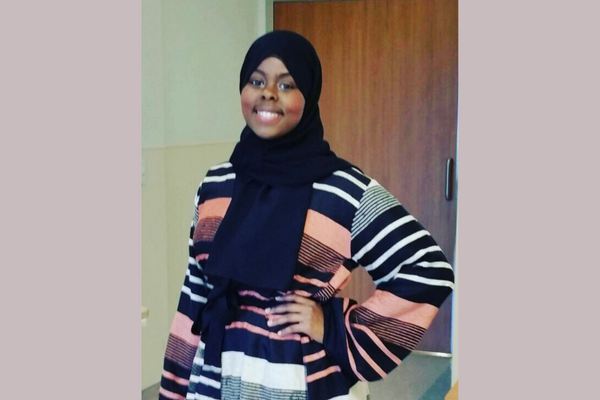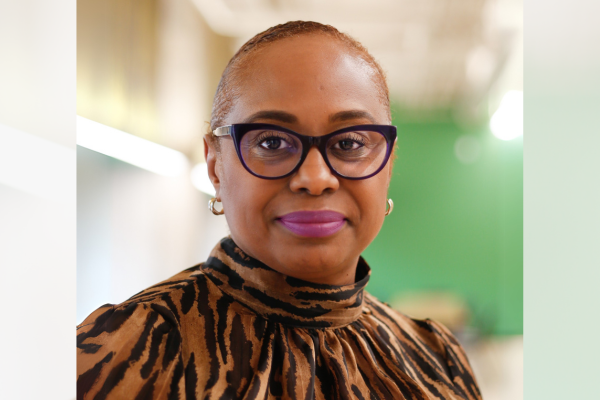Driven by her brother’s story, this U of T student is leading research on anti-Blackness and care for traumatic brain injuries


As an undergraduate student in 2014, Samira Omar turned to academia to help her family understand her brother’s traumatic brain injury (TBI).
Omar, now a PhD candidate in the Rehabilitation Sciences Institute at the University of Toronto, studied everything from the technologies used in acute care settings, models of care and theories, and explored resources available to help her brother at home. Her resourcefulness and determination became a tool in navigating a healthcare system that she felt wasn’t fully helping her brother recover.
“It felt like every day was a fight for survival to convince people that this person deserves to live and get the best quality of care,” Omar says.
“After experiencing everything that we did, I couldn’t look back on my life knowing that this system that presents itself as helping everyone still existed, when that was not the case and we would have to continue to interact with the system for many years to come.”
Now, Omar is driven to ensure future TBI patients receive the quality of care that they deserve. Her research at the Rehabilitation Sciences Institute has focused on the intersections of anti-Blackness, rehabilitation science and TBI. In just a short amount of time as a researcher, she is already providing valuable insight in the space by leading critical research about the impacts of systemic racism in the Canadian rehabilitation industry through her dissertation.
In preparation of her dissertation, Omar interviewed Black-identifying TBI survivors, their family caregivers and rehabilitation providers across the Greater Toronto Area (GTA) who have received care in rehabilitation centres, clinics and hospitals. Her dissertation focuses on a narrative inquiry of more than 30 different interviews to understand their experiences and perspectives on rehabilitation access and quality of care in Canada. The results will be available in the new year.
“No studies to date have specifically focused on these intersections from a Canadian context or even qualitatively in North America. To our knowledge, my dissertation is the first body of literature focusing on Black experiences of TBI rehabilitation in a Canadian context,” Omar says.
In a scoping review, Omar traced how anti-Blackness, race and racism are documented in literature about integrated care pathways for TBI and how Black patients accessed care in the United States. She found that 23 per cent of studies provided an analysis on the intersections of race and sex or gender, with insight into how Black participants were coping. Black-identifying patients are primarily denied access to care and experience poor quality of care, including lower rates of protocol treatments, and lack access to rehabilitation services.
Omar also found that most authors would talk about disparities in care through the reference of ‘symptoms of racism,’ such as inequities, prejudice or bias, but not use the term itself. The finding reinforces institutionalized racism in research on TBI care.
In February, Omar was a recipient of the University of Toronto Student Leadership Award, which recognizes students for exemplary leadership, service and commitment to the university. The honour comes after several initiatives Omar has led – and continues to build – to foster spaces for students to network, find mentorship opportunities and discuss TBI research. She is also one of five recipients of the inaugural Temerty Award for Excellence in Professional Values, which recognizes faculty members and learners for their outstanding contributions to relationship-building, academic, clinical and administrative initiatives, amongst other achievements.
This year, Omar was also awarded with the 2021 Neurological Health Charities Canada Change Maker Award for her advocacy to improve quality of life for underserved populations with traumatic brain injury.
Last year, Omar and a small group of students organized a conference to offer a cross-institutional conversation about equity, inclusion and justice for occupational therapy and occupational science students. The first-of-its-kind event brought students and leaders in the clinical and research spaces from across Canada and the U.S. together to critically discuss the steps and supports needed to contribute to institutional change in the practice of occupational therapy and research field of occupational science.
“Aside from sharing our narratives, we really wanted to have a critical conversation about transformational change, what we need to do to get there and the support that we need to meet the needs of people we are going to be serving in research and in practice,” Omar says.
As a result of her contributions to occupational therapy in Canada, Omar was awarded with the 2022 Honorary Canadian Association of Occupational Therapists (CAOT) membership award.
What is her advice for future students? Think about what you want to achieve and have a clear vision of what it will take. Don’t be afraid to jump out of your comfort zone and find ways to achieve your goals, and find like-minded community and peers to support you.
“When you put in the effort to contribute to meaningful change in the lives of people around you, and do it with a sincere sense of compassion, magical things can happen,” Omar says.







